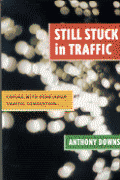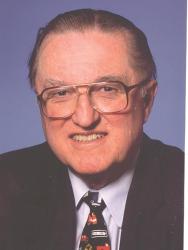Congested roads waste commuters’ time, cost them money, and degrade the environment. Most Americans agree that traffic congestion is the major problem in their communities—and it only seems to be getting worse. In this revised and expanded edition of his landmark work Stuck in Traffic, Anthony Downs examines the benefits and costs of various anticongestion strategies. Drawing on a significant body of research by transportation experts and land-use planners, he counters environmentalists and road lobbyists alike by explaining why seemingly simple solutions, such as expanding public transit or expanding roads, have unintended consequences that cancel out their apparent advantages. He argues that while there might be some measurable gains from increasing housing densities, most other land-use strategies have little effect. Indeed, the most powerful solutions, including higher gasoline taxes, increased public funding for transit, and highway tolls, are also the least palatable politically. St ill Stuck in Traffic contains new material on the causes of congestion, its dynamics, and its relative incidence in various parts of the country. In clear and realistic terms, Downs seeks to explore why traffic congestion has become part of modern American life and how it can be kept under control.
Anthony Downs is a senior fellow in the Economic Studies Program at the Brookings Institution. His specialties are housing, real estate, real estate finance, metropolitan planning, demographics, and transportation. His books include New Visions for Metropolitan America (Brookings/Lincoln Institute for Land Policy, 1994), and Still Stuck in Traffic: Coping with Peak-Hour Traffic Congestion (Brookings, 2004).


